Unemployable
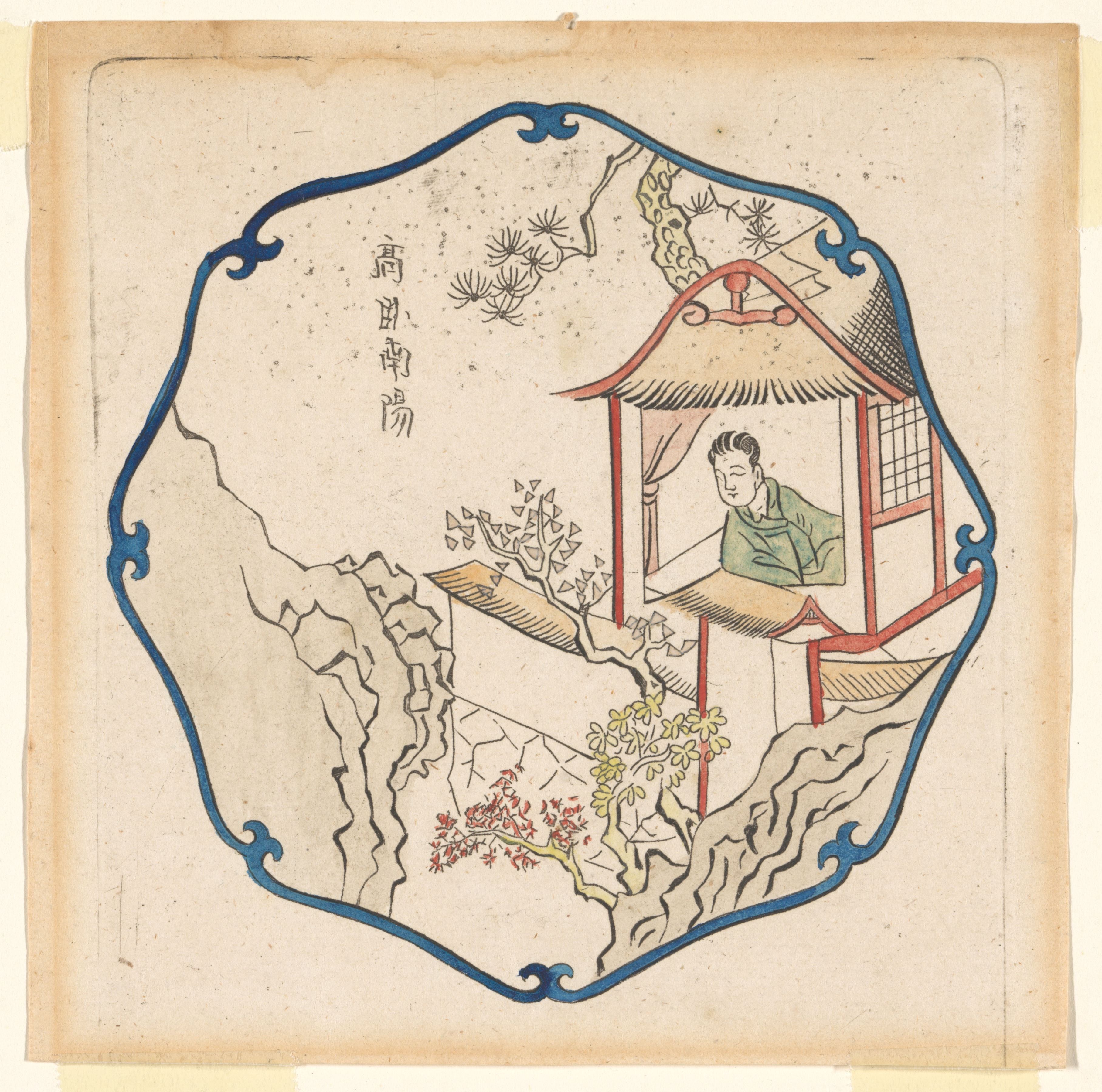
Pieter Schenk: Carefree life in Hsin-yang (1702)
"We will never satisfy the formal definition of Hard Working …"
People ask me if I'm retired and I reply that I'm not, just Unemployable. I believe that unemployability has become a common state for people of a certain uncertain age. For some, Unemployability comes early and for others, later, but I dare suggest that it eventually comes for most. This amounts to no tragedy, for employability seems to be a self-liquidating state. The very act of holding a job undermines an incumbent's ability to hold that job. Eventually, this contradiction does in the job or the incumbent or both, often resulting in the incumbent's growing sense that he just can't bear to do that anymore, coupled with a conviction that to continue doing that might well prove terminal. Eventually, no amount of money in this world could properly compensate the afflicted individual. No "opportunity" sufficiently attracts. In other cases, more like my own, an individual simply grows to lack baseline skills necessary to successfuly maintain employment. He becomes a buggy whip in an automobile world. I, for instance, cannot operate a PC or type with more than two and a half fingers, both terminal shortcomings in today's competitive job market.
Unemployability seems distinctly different from obsolescence, for the Unemployable are far from idle.
Structural
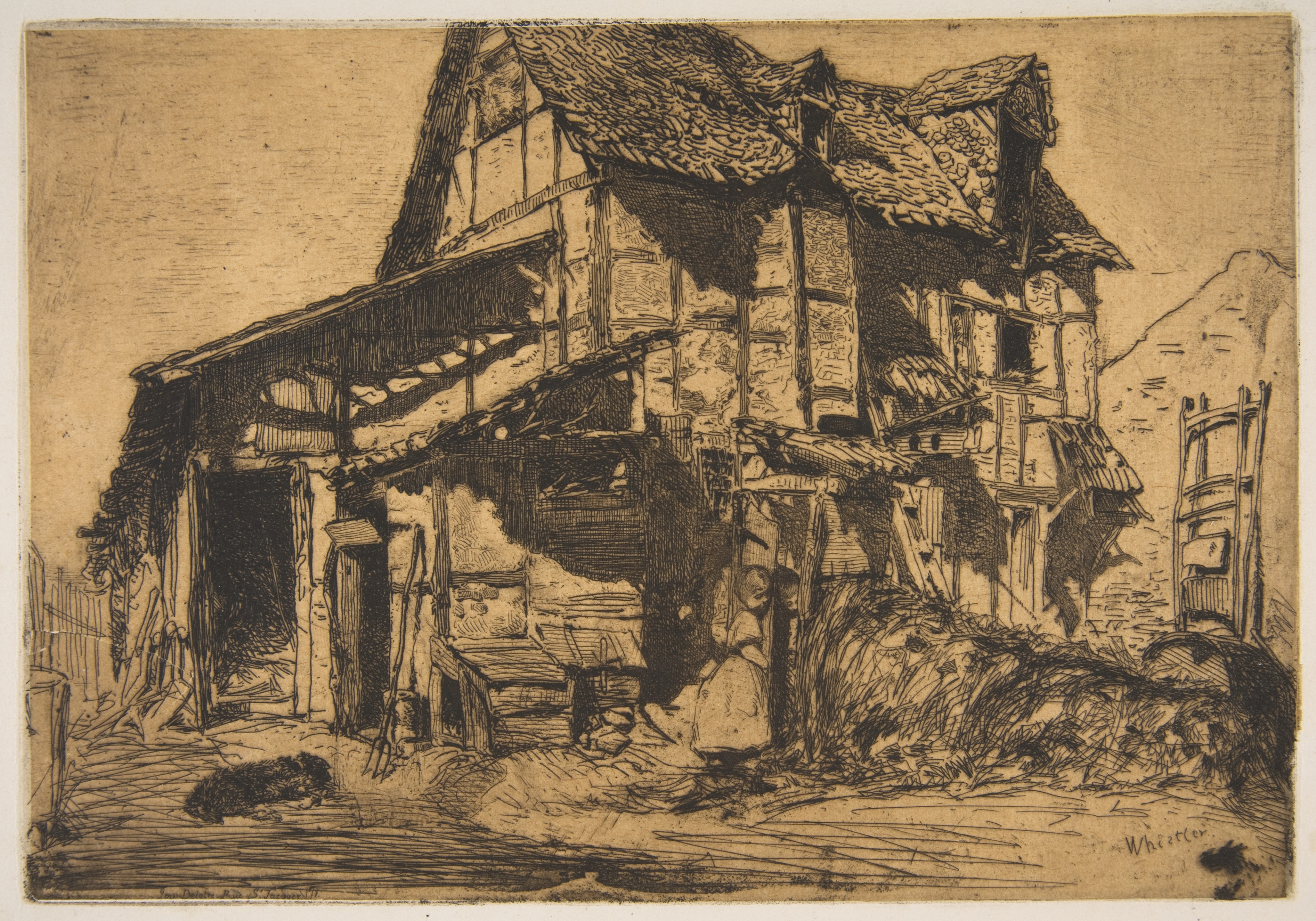
James Abbott McNeill Whistler: The Unsafe Tenement (1858)
"I'm much more skilled at the consequently superficial …"
I specialize in superficial strategies. I was the one who imagined such a thing as Brief Consulting, a philosophy rooted in the firm if not always fully justified belief that most difficulties might be fairly easily co-opted via clever reframing, that insight might often trump knowing, and that we mostly suffer from varying degrees of The Normals. It was a radical perspective dressed up as conservative approach since it only infrequently insisted upon anyone making any structural changes. It accepted the way things are as the way things are, and didn't often aspire for very much different. It was more about coping than changing, anyway.
I still find little to criticize about Brief Consulting.
Inistential

Albrecht Dürer: Celestial Map of the Southern Sky
[Imagines coeli meridionalis] (1515)
" … we are the existential threat …"
We seem to inhabit a world beset with existential threats. An existential threat, for those who, unlike me, do not collect lengthy terms like fishermen collect worms, imperils our very existence. In other words, should an existential threat come to fruition, it would destroy us. Polly Pureheart faced an existential threat when Snidely Whiplash tied her to that railroad track, though I never understood why he chose to do that. Had a train come along while she was tied there, it would have been the end of her. Fortunately, Dudley DoRight's horse Nelly noticed something amiss and carried Dudley to the scene of the impending existential threat, where he was able to easily neutralize Snidely's trumped up existential threat on poor Polly, who, as a result, fell in love with Nelly, if my memory serves me correctly. Existential threats, as this story demonstrates, are very serious business.
We might also inhabit a world beset with what I might call Inistential threats, imagined perils we project, which certainly seem to us to qualify as existential threats.
ThinkingUnder
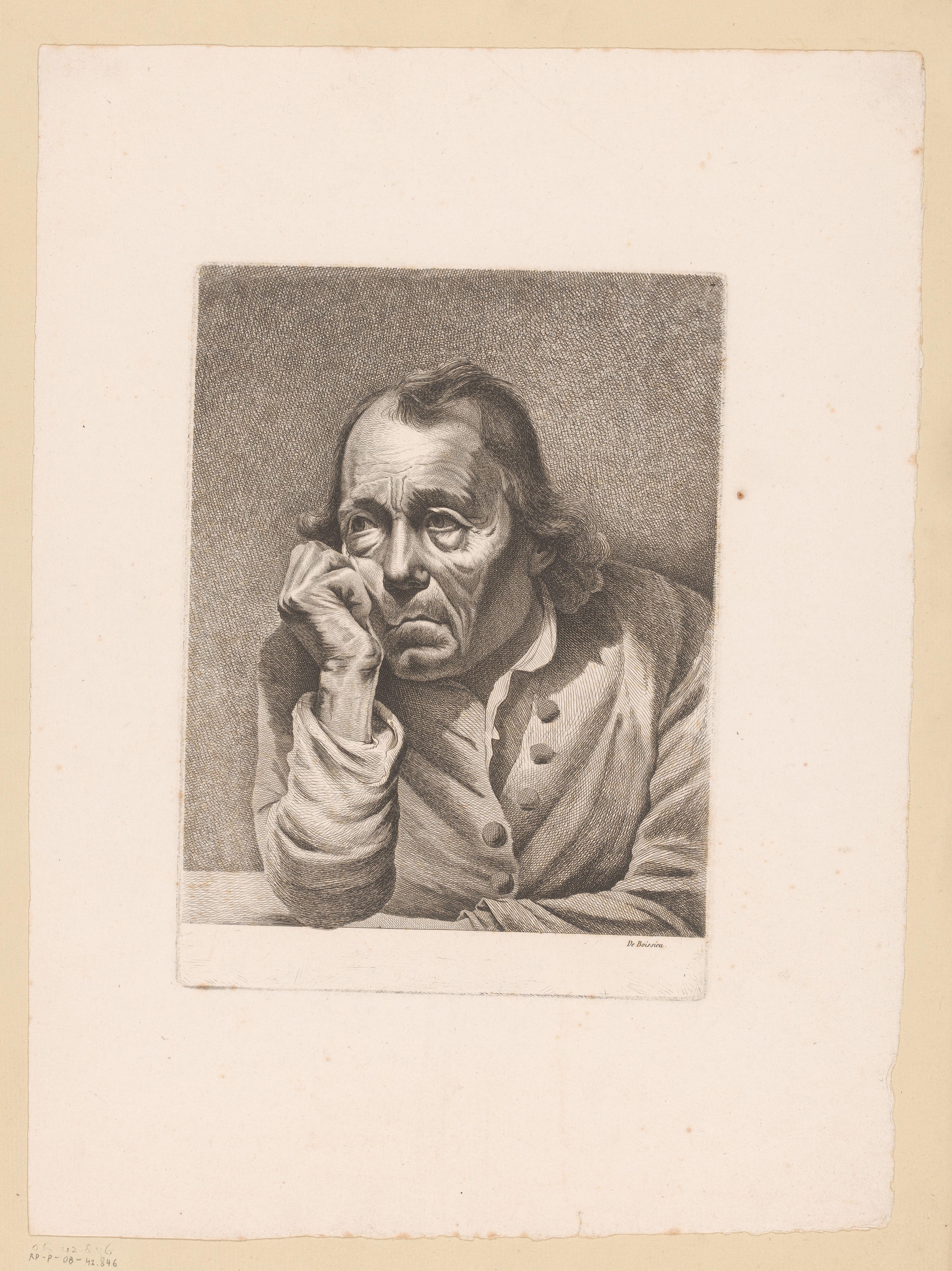
Attributed to Ignace-Joseph de Claussin, after Jean Jacques de Boissieu: Oude man in denkende houding (1805 - 1844)
"I make progress, then, depending upon how utterly stupid and uninquisitive I can remain …"
I have been accused of over-thinking on many occasions, perhaps because I tend to think as a first defense. It's my default response. Like all default reactions, this one does get over-used if only because it's almost always the one already saddled up and ready to go whenever anything happens. This results in a fair number of false positive reactions, where I apply precisely the wrong leverage in response to some otherwise ordinary perturbation. This amounts to perfectly normal behavior, though it often appears absolutely crazy. I imagine myself producing similar results whatever response I favored. If I tended to burst into tears in response to anything, I would seem well-adapted some percentage of the time, but I'd mostly build a reputation for being weepy. I suspect that most of us favor some pre-loaded reaction and thereby tend to react strangely some of the time. My thinking responses do not really qualify as wholly unreasonable, though thinking can sometimes violate the First, Do No Hard Clause under the standard rules of engagement.
Much work is by nature properly considered mindless.
FairTrading
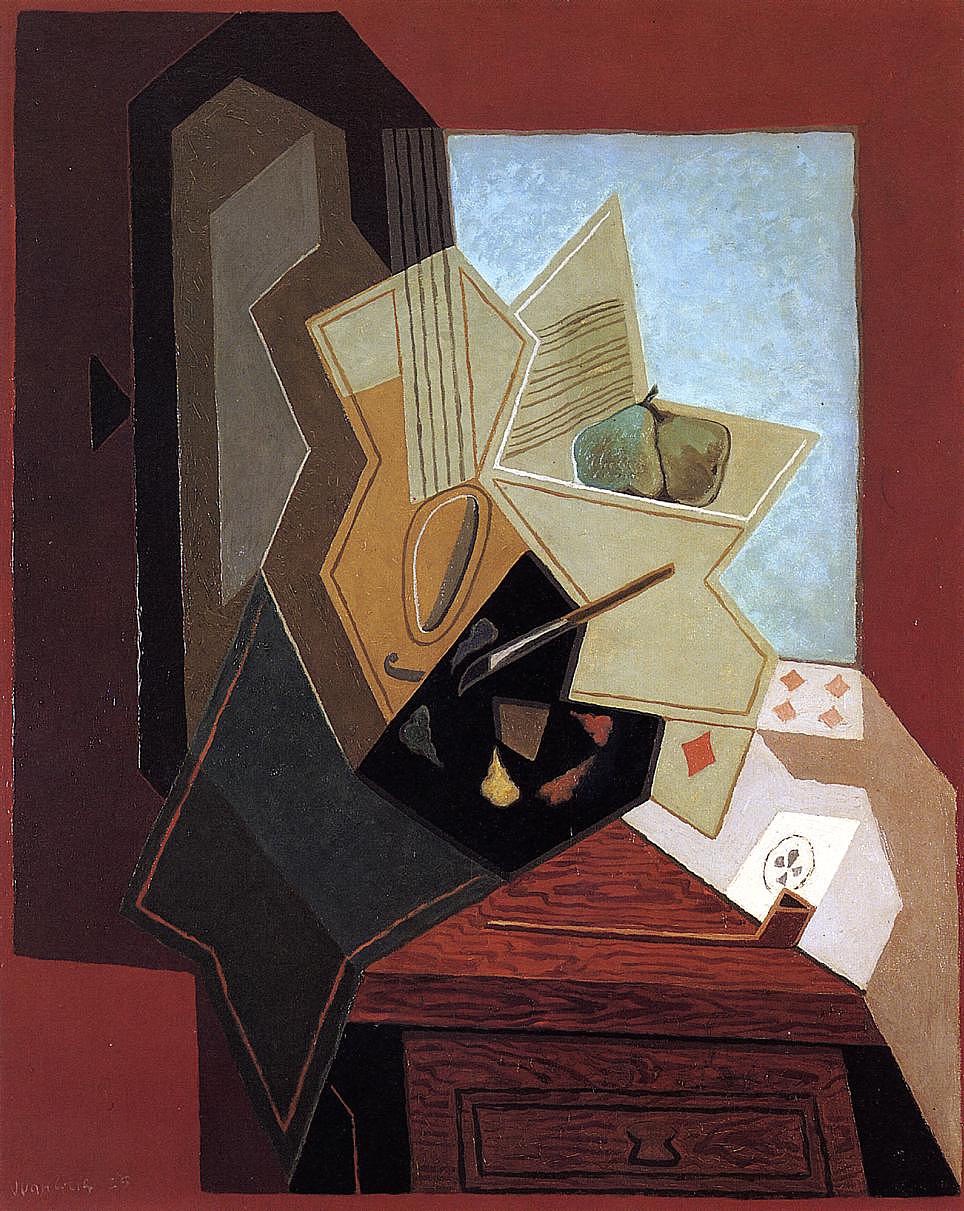
Juan Gris: The Painter's Window (1925)
" … the new dog teaches the old dog a new trick or two."
The Repeated Offender reader of these musings will remember Kurt Our Painter, who was a prominent figure during our extended Grand Refurbish last year. Kurt proved an able sidekick, teaching me about the practical application of paint, which turned out to be a surprisingly—shockingly— philosophical endeavor. Kurt carries an easy half century experience as a professional painter, and he's still learning, for painting, like most activities, I suppose, never was a simple matter. Of course, any Jehu can slop the stuff, though sloppy painting does disclose a definite lack of character. Real painters are painstakingly careful, patient even beyond their own belief, and wise. They change the world one mil at a time or less. They refer to accumulating paint in mils, though measuring actual depth proves impossible.
When painting, Kurt taught me that a single mil of paint sufficiently covers any lightly-used surface.
AgingInSpace
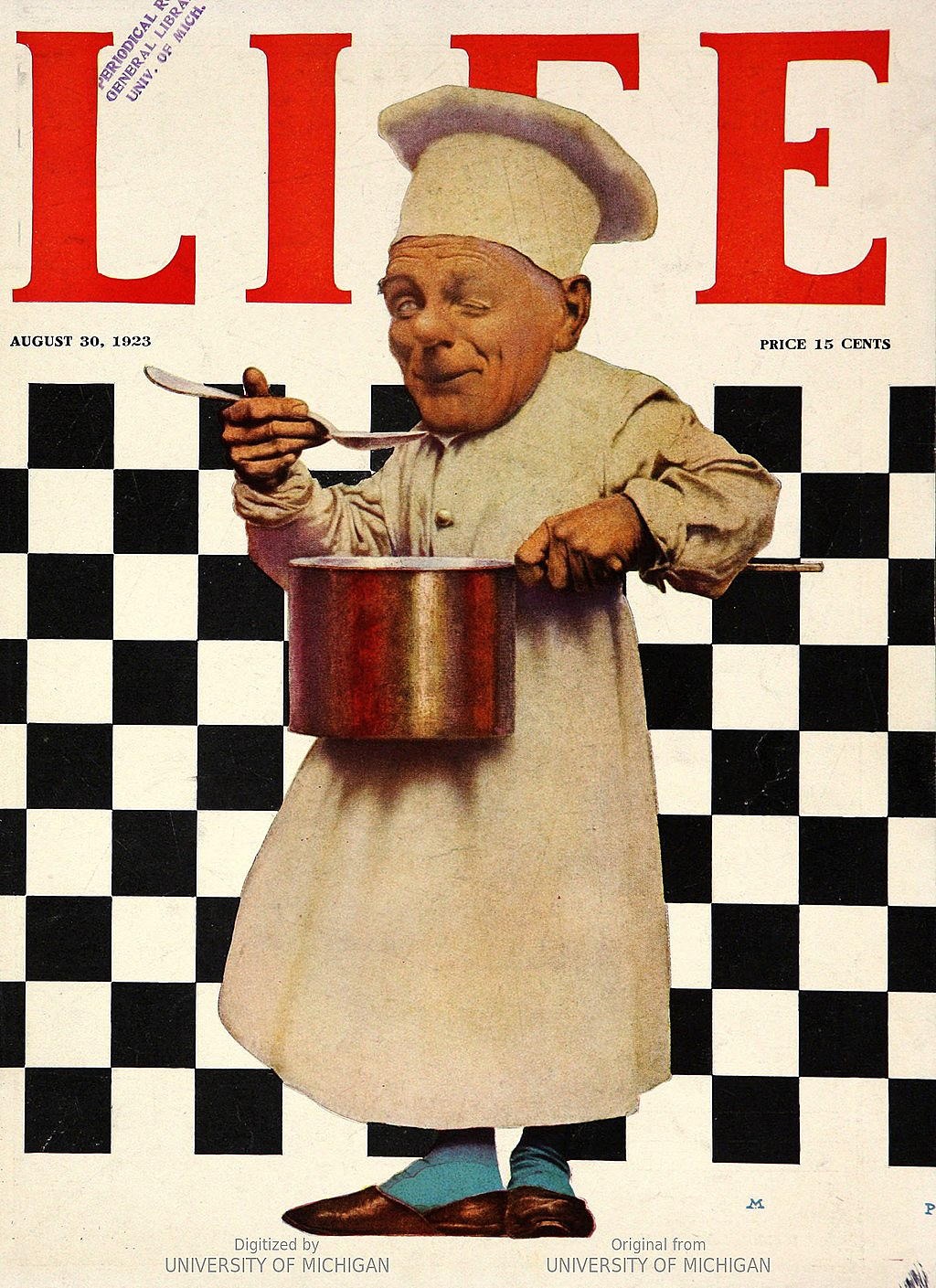
Mayfield Parrish: Painting for cover of 30 Aug 1923 Life magazine
" … enjoying the journey though I knew where it was leading."
I find myself presently engaged in a rare effort, though I suspect that such activities might well become more frequent and more common in upcoming years. I claim to be repainting three sides of The Villa Vatta Schmaltz, an activity I have already in this lifetime engaged in once. What Makes this iteration different? I reasonably and fully expect that this time will be my last time erecting scaffolding around this building. If this work ages as planned, this place will not require another coat of paint in my capable lifetime. It will certainly need repainting in the far distant future, but by then, I do not expect to be physically capable of performing this service, however much I might wish to. It's genuine pain-in-the-butt grunt work, so it wasn't precisely a gift I gave myself when I decided to perform this job, yet I felt gifted.
I imagined myself savoring each brushstroke, immersing my full consciousness into the experience, painstakingly burning the effort into permanent memory, however foreshortened that might prove now.
PhilosopherWork
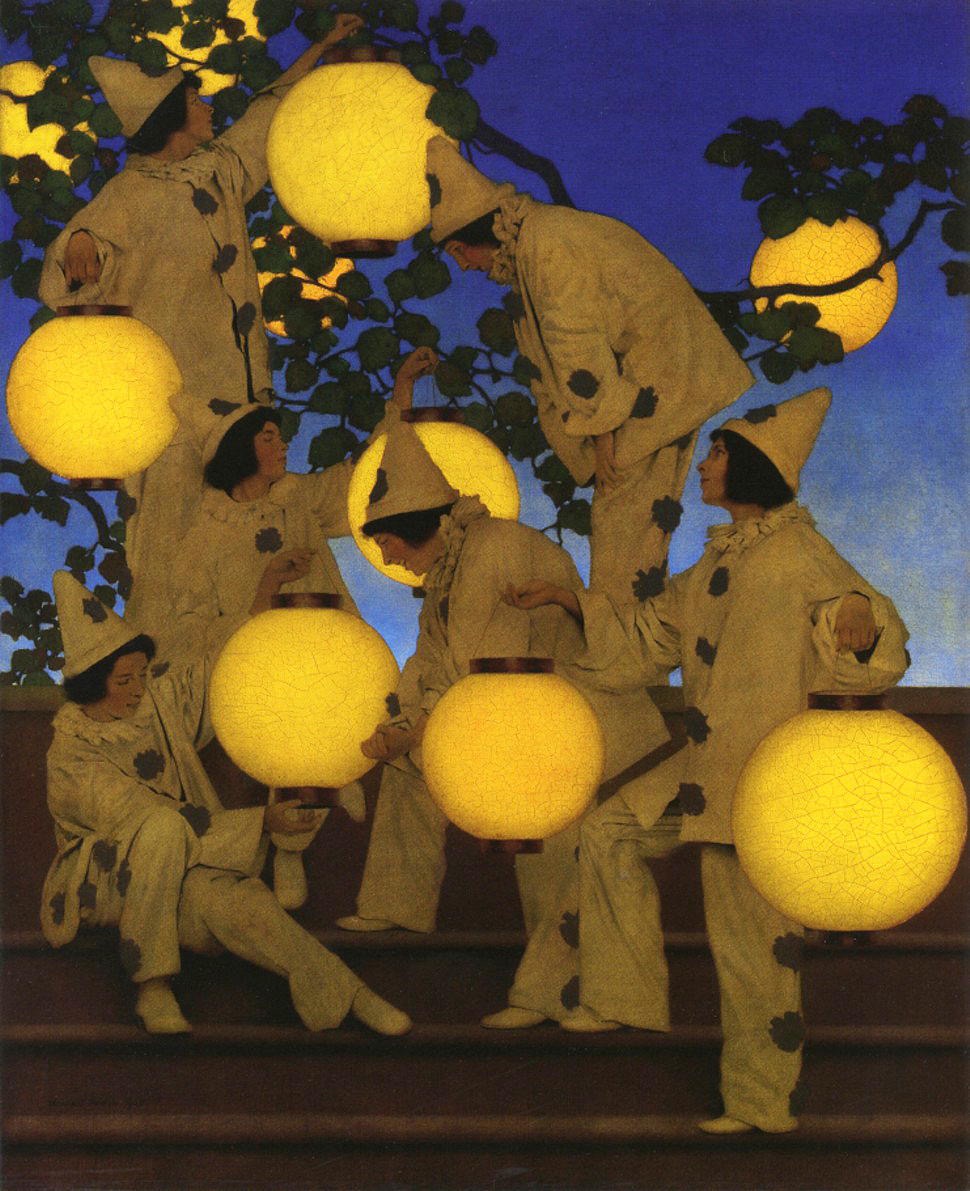
Maxfield Parrish: The Lantern Bearers (1908)
"The philosopher's wary."
I have my heart set on a blue front door. Kurt Our Philosophical Painter reappears in my stories this week as he returns to finish the door we left undone in deference to Winter as we otherwise completed our Grand Refurbish. I'd intended to replace the rickety front screed door, thereby making it possible to secure the front even with the door removed, and that screen was replaced earlier this month. I peeked out my office window to see a crew of two exit their truck and head for the porch. I opened the door before they'd knocked and welcomed their presence. The new screen was fully installed less than an hour later. I didn't help much because they'd caught me immersed in my PhilosopherWork so I wasn't dressed for workman work. I find myself continually shifting gears between one persona and the other. Which am I really? Neither and both.
The philosopher in me prefers to work in slippers.
HomingPlace
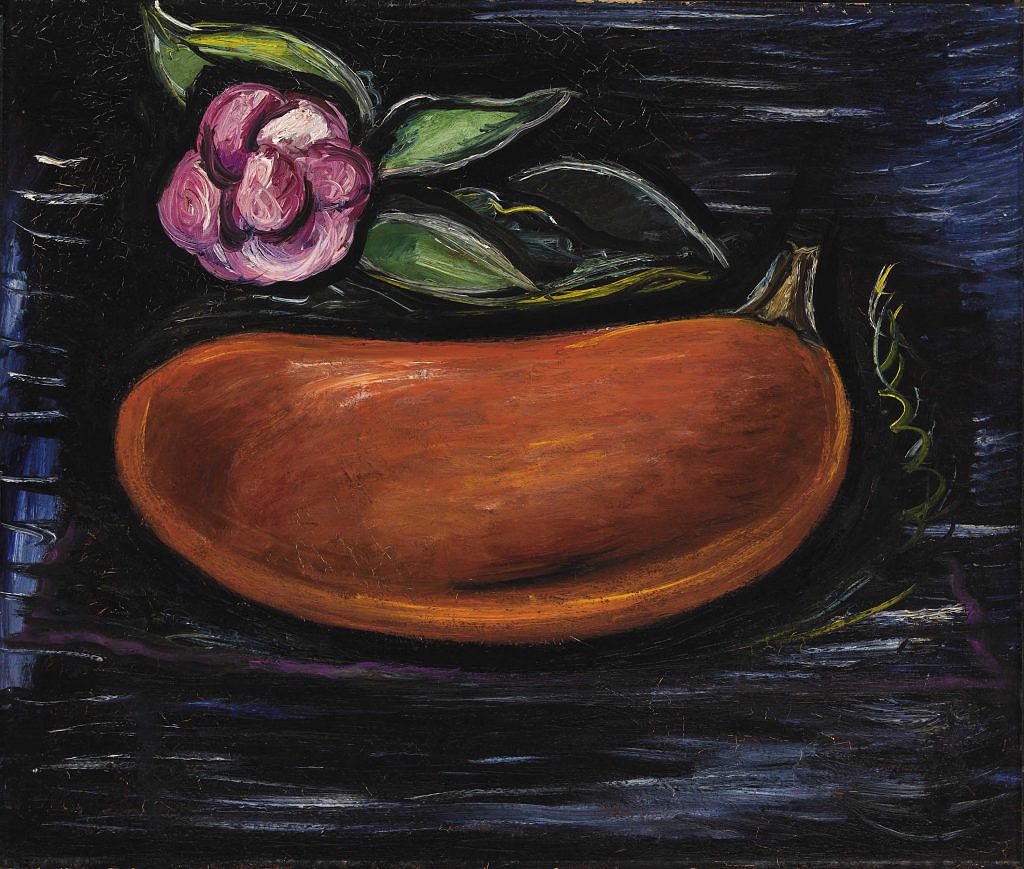
Marsden Hartley: “Still Life” (1932-1933)
" … our point of real reference."
It may be that there's no place like home, but I'm noticing that there's really no place like the HomingPlace, that place from which one continues the infinite homing search. It seems that search never ends. For me, my old home place is not a place of rest. My Reconning didn't cease when The Muse and I retook possession, but increased both in pace and purpose, for my Reconning finally had a base from which to once again sally forth from again and again and again. I might roost here, but this old place more prominently serves as a point of departure than a place of repose. I'm clearly going somewhere. So's The Muse.
When on exile, our Reconning seemed more like practice than purposeful.
CaughtUp
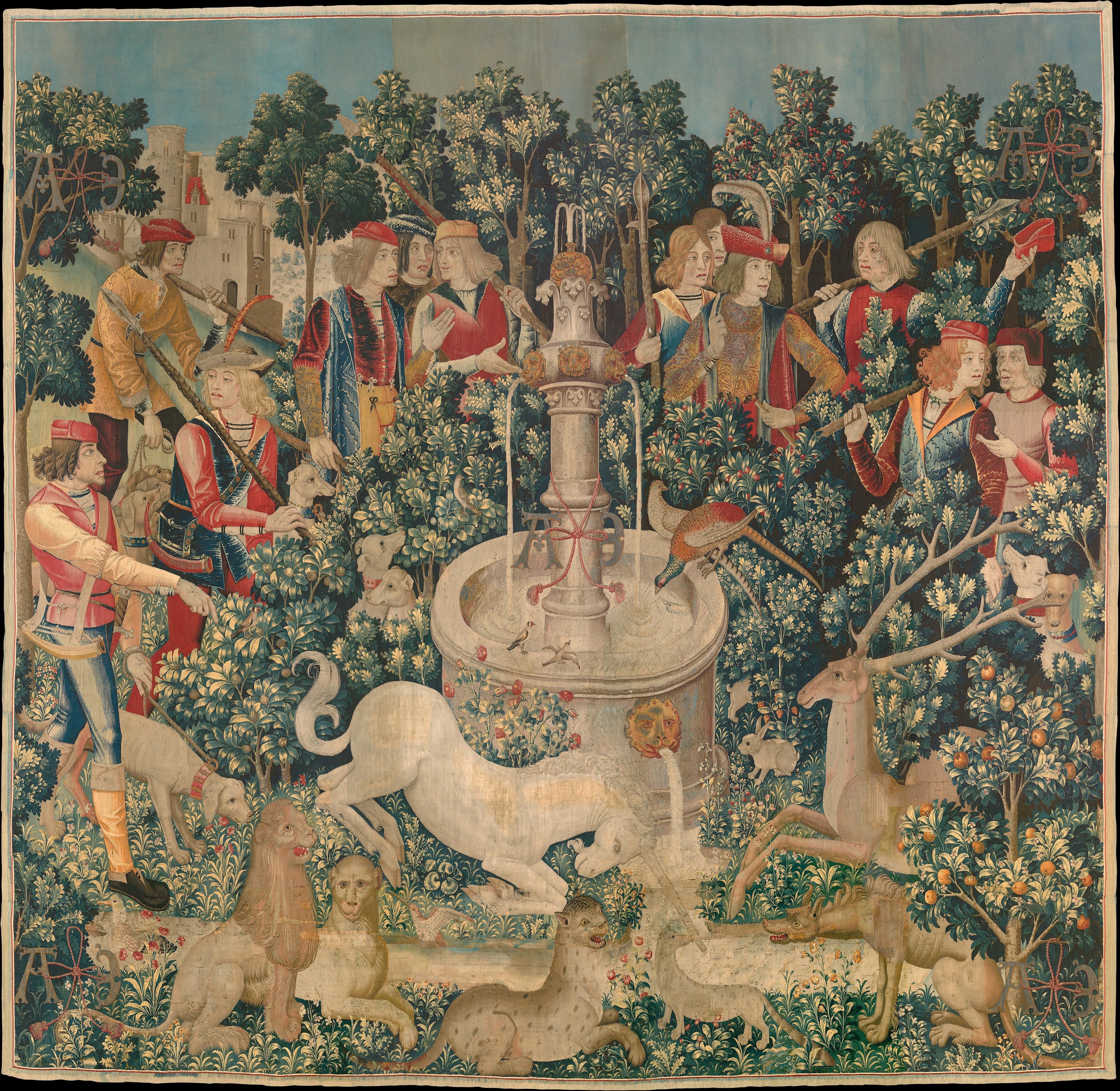
French (cartoon)/South Netherlandish (woven):
The Unicorn Purifies Water (from the Unicorn Tapestries)
(1495–1505)
"None of us run this race to win it …"
I complain that I'm behind just as if I was ever what even a generous interpretation might consider CaughtUp. As near as I can tell from here, I was born behind and I have been falling ever further behind since. Even when I accomplished something, I recognized that I could have done more had I really applied myself like I know I could have. Whenever I accept a fresh assignment, it lands on top of the pile of unfinished business I already have open and cluttering my desktop. When I finally organize something, a few bits of whatever it is won't quite fit into my new classification scheme, such that a strict judgement of the finished product should be that my product isn't quite finished. I maintain many backlogs, just as if they'd ever become anything else. Finished and done largely seem like acts of abandonment. I graduated from both high school and university with unfinished business. It took me a while to understand and accept that graduation resolved nothing except that I'd never be able to clean the plates I left partially eaten there.
I almost remember a time when I had actually CaughtUp.
HighApril
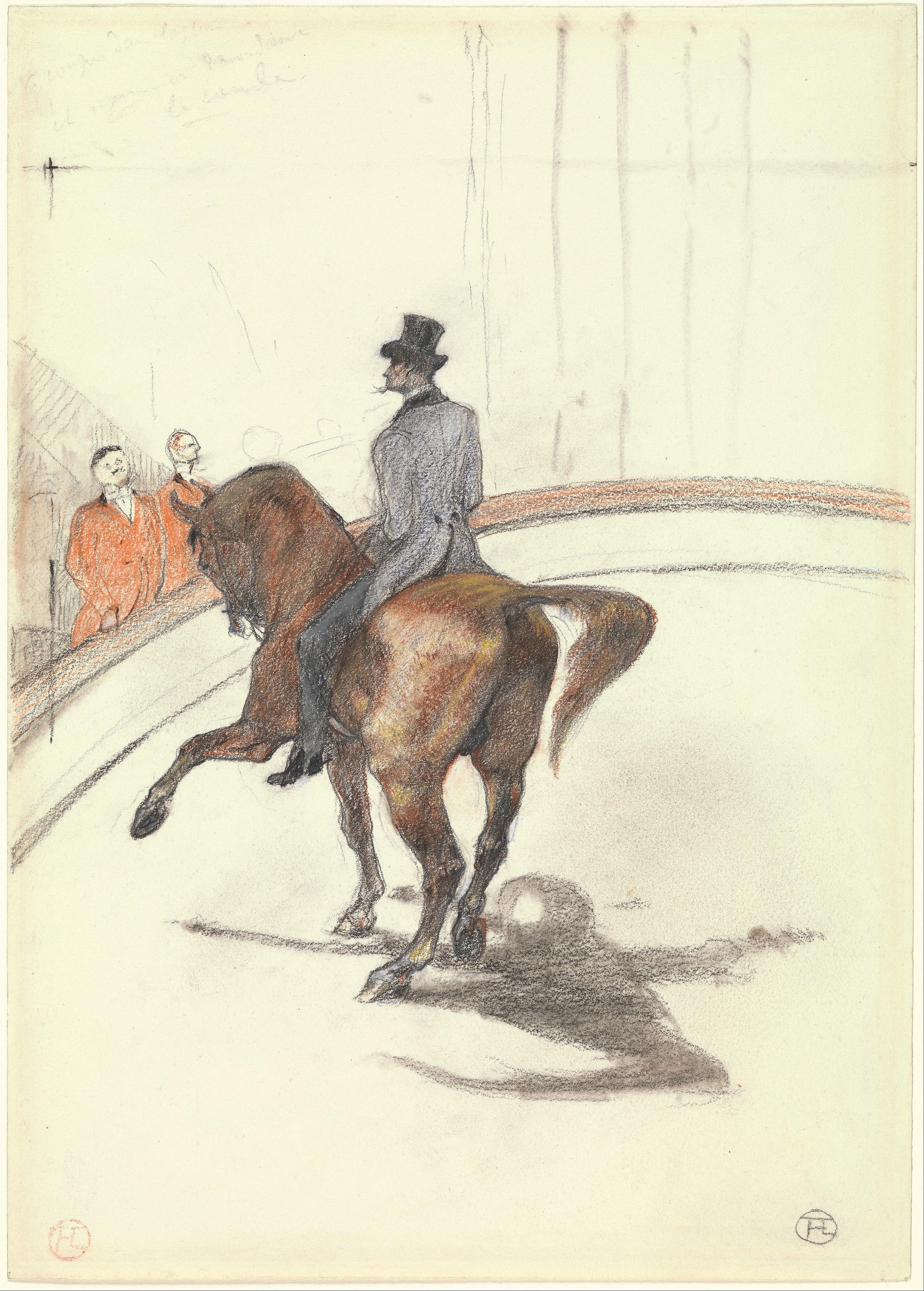
Henri de Toulouse-Lautrec: At the Circus: The Spanish Walk
[Au Cirque: Le Pas espagnol] (1899)
"… maybe saunter over to the neighbor's …"
Both Max and Molly, our cats, were scheduled for their annual vet visit Tuesday morning. Anticipating trouble from Molly, who remains steadfastly standoffish and feral, I dosed her with enough CBD to mollify a moose. Even so, I slipped into my heavy leather yard gloves before attempting to pick her up and tuck her into her carrier. I pulled off that move without a hitch, but Max had witnessed the kitnapping and just to help, Molly began crying most plaintively, which clearly alarmed Max. Wary then and probably remembering his past cat carrier experiences, he bolted. Then we played an extended game of catch or, more properly, failure to catch. I did manage to nab him twice as he passed by, but only because he's so deep down good natured that he likely couldn't quite muster the belief that I intended him harm. I stuffed him into his carrier, or tried to, and he managed to contort himself into a ghost and exit while I shoved him in. After two failures, I gave the game to him and decided that I would just have to explain his absence and seek another appointment, taking Molly in alone, which would probably be better, anyway.
Molly, probably thanks to the CBD, performed beautifully, submitting to touching and probing from a stranger, something she won't usually agree to at home among family, and all was well with the world.
Interruptus
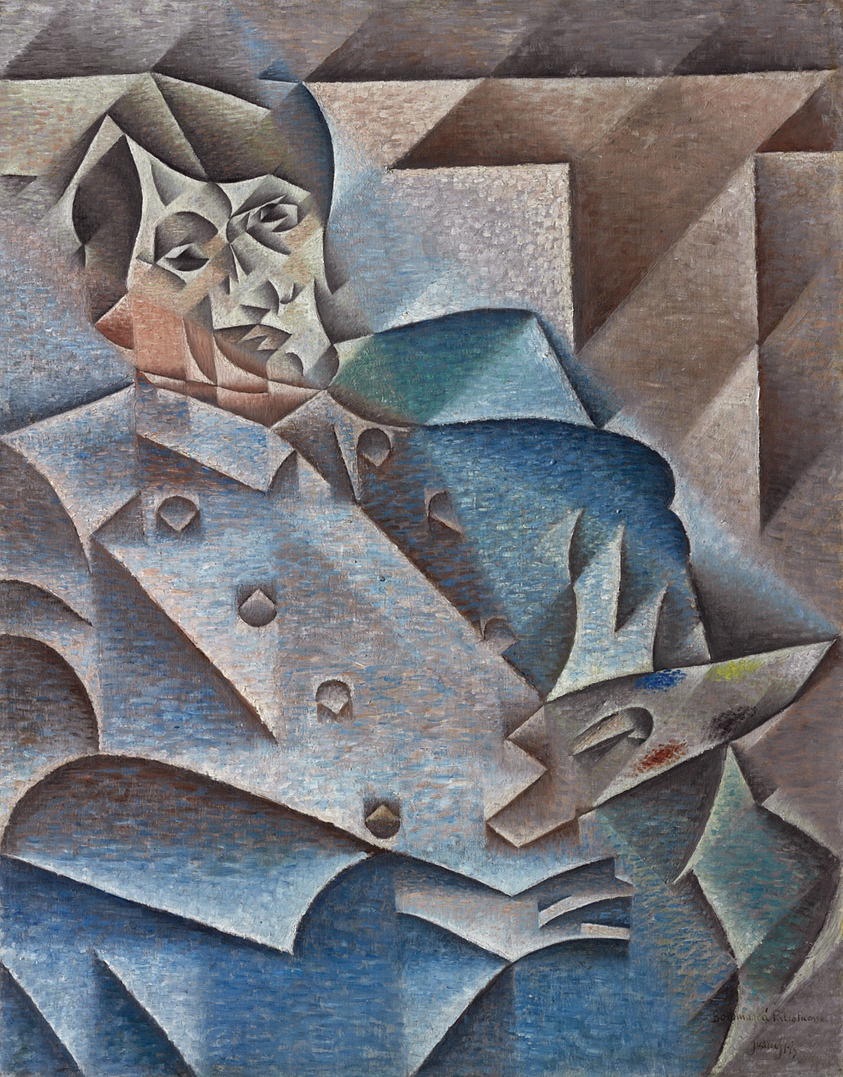
Juan Gris: Portrait of Pablo Picasso (1912)
"Higher education, lower expectation."
The pace of classes at university fascinated me. Assignments came without regard to the size of my plate or any preexisting condition. The fact that some other class featured unrealistic expectations in no way inhibited every other class from having them too. These conflicts could not be resolved. Such was the paradox of higher education. One was chided to become a good student, but not even the best student was really expected to complete every assignment, to read every chapter, to ace every exam. Those who excelled were like The Muse, who was born with the ability to pass any test, even if she'd not studied, because she understands how to ace tests, I guess. I was not so blessed.
My university days were filled with guilt over all I could not complete.
Finishing
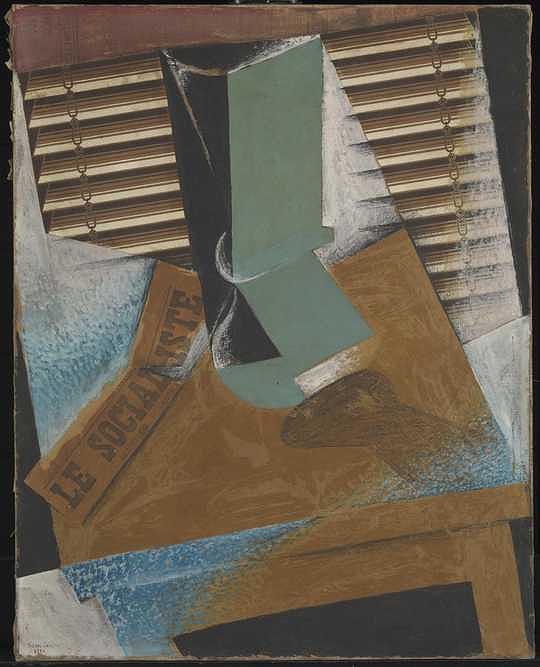
Juan Gris: The Sunblind (1914)
"Some future unobservant audience will most certainly be impressed …"
I say that I'm refinishing this door, but I do not expect to reach an end. A time will come when I will choose to abandon this effort as either lost or good enough, essentially equivalent conditions, and focus my attention elsewhere, but for now, for today, I focus here. So much of my life seems to carry just this quality, where I'm not actually doing whatever I'm declaring myself doing. I do not intend to misrepresent my actions, for with this kind of work, misrepresentation might be the only possible representation. I say I'm finishing. I might be refinishing, but I do not labor to reach an end. I labor to begin and to properly attend.
This door was once damaged beyond all hope of repair.
Refelance
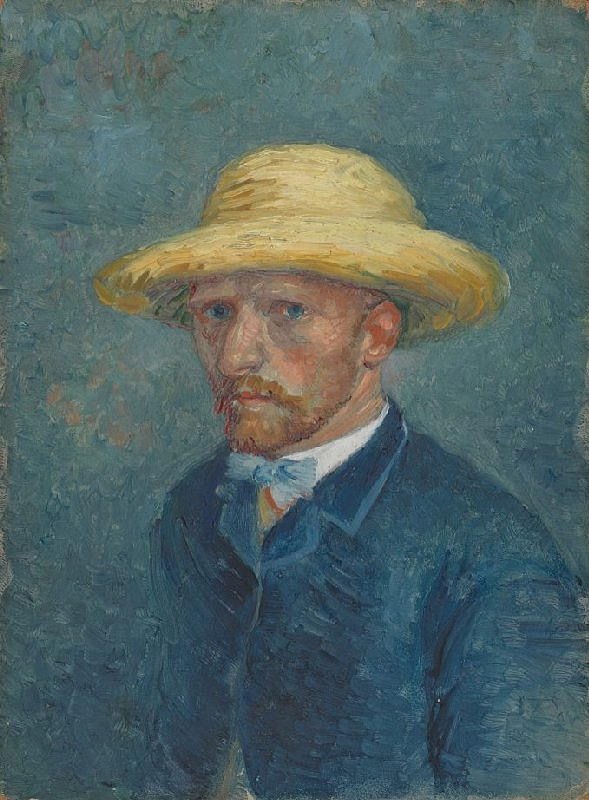
Vincent van Gogh: Self-Portrait or Portrait of Theo van Gogh (Paris, Summer 1887)
"[I] never learned to trust popularity."
I might fairly characterize modern life as a search for relevance. Certainly media, public as well as social, a prominent presence in our Damned Pandemic-separated lives, operates under a strict perversion of the Democratic process, where the number of views/likes/shares/comments determines relevance. I'm uncertain who first proposed simply voting as a means for determining relevance, but majorities have since voted in favor of the most remarkable and remarkably stupid things. It seems rather rare that a number one-rated program comes anywhere near being the best program produced that year. Same with recordings. Same with films. Same, too, with seemingly almost everything. Popularity in the polls has become the new relevance, a condition to which I'll assign a potentially more telling term, Refelance, meaning 'referred relevance.'
How does an artist, a creator, any producer determine relevance?
Resturrected
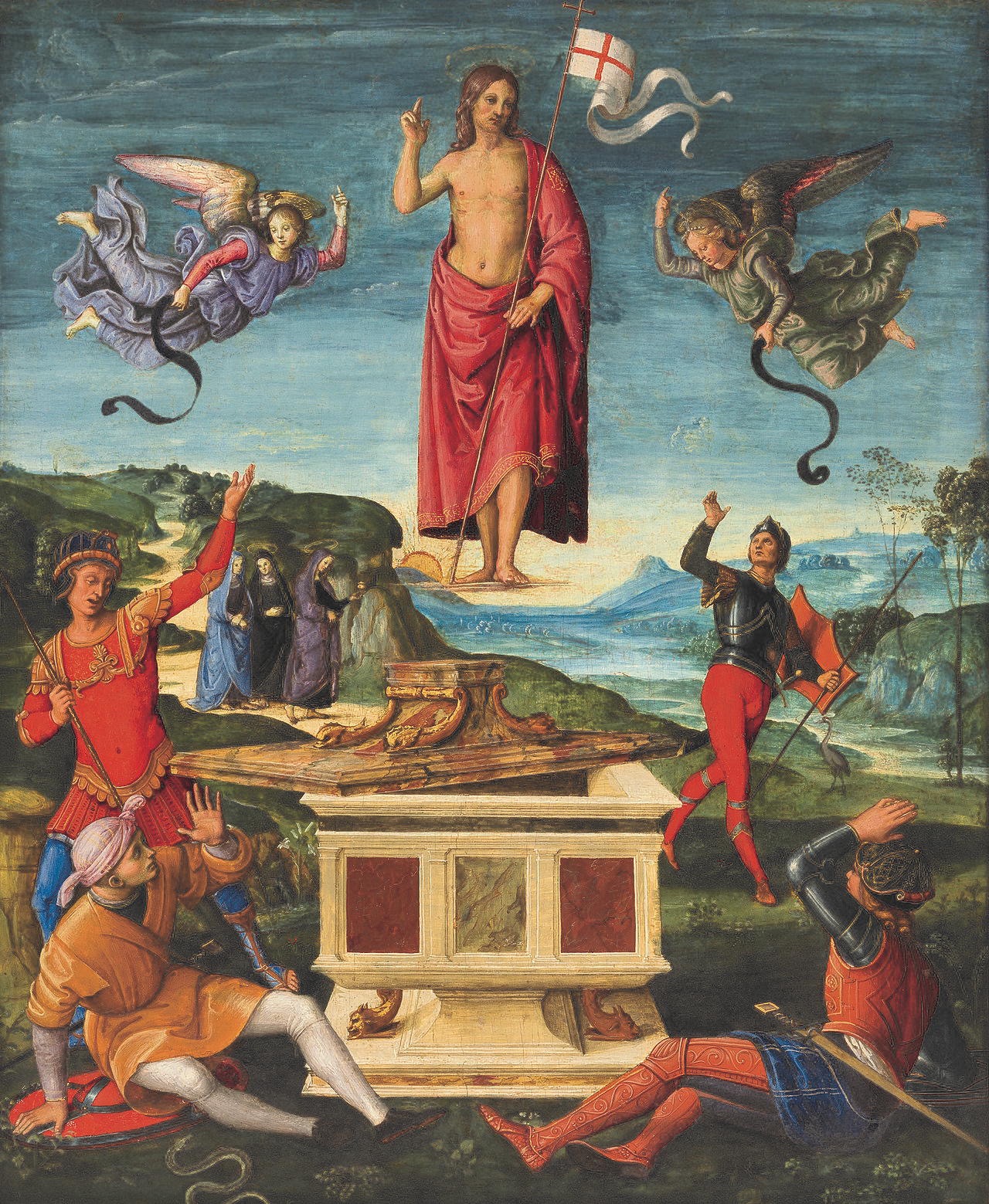
Raphael: Resurrection of Jesus Christ (1502)
" … already arrived and on the path intended …"
Perhaps the gravest error when Reconning lies in the usually innocent attempts to plot courses to the past. We know the past much better than we know our future, so it seems a smaller stretch of imagination to project that rather than to muster fresh visions, but resurrecting's no less speculative and much more dangerous. This universe, for better or for worse, runs exclusively forward, from past toward future, and any attempt to reverse this sequence should properly create serious consequences, however unintended. That a major world religion was predicated upon resurrection seems curious if also telling, for Jesus' great works all came before the resurrecting rather than after. After, he managed an ascension, which I guess amounted to another separation, with promises, of course, but he seemed just as gone after ascension as he seemed just after crucifixion, leaving an observer to wonder what resurrection accomplished other than to confuse a question. After ascension, the legend remained, plenty powerful and present, same as just after he first departed.
I suppose I speak heresy or disclose my lack of biblical literacy, but on this Easter morning, I find myself considering another sort of celebration than one focusing upon defeating death with resurrection.
Reprieving
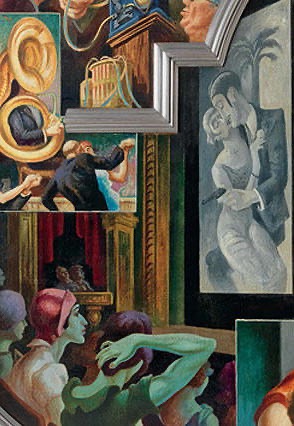
Thomas Hart Benton: City Activities with Dancehall
from America Today mural (detail), 1930–31
" … this universe appears to be self-correcting …"
I imagine this to be a self-correcting universe. I suspect that this notion comes from the inescapable fact that nobody really has the slightest influence over this universe's trajectory and that most of its business occurs on scales which could never have the slightest direct effect on anybody. It's a continuously playing movie which never once repeats but which appears so uniform as to appear familiar. My plans might not always come to fruition, but among the infinite alternative resolutions, at least one workable substitute very reliably seems to show up. Eventually. The net effect seems to be an infinite engagement in which I for some reason choose to involve myself in finite segments, some of which do not work out but for those that don't work out, I receive a Reprieve. An alternative appears to, if not precisely save the day, preserve potential.
That's not to say that I've never been disappointed.
ExilesReturn

Thomas Hart Benton: Outreaching Hands from America Today mural (1930–31)
" … to seek dignity rather than desire."
An Exile'sReturn feels no less traumatic than his exit, for both events demand skills not previously in evidence in our hero's experience, however vast. He left only because he could not possibly stay, hardly a proper preparation for anything following. He returned because he'd finally earned passage, but after such a long absence that he would not be returning to from whence he once departed, but into a rather darkening sunrise. In most ways, an Exile'sReturn turns into yet another exile, an extension of the discontinuity begun when he first fled into exile, unaware that he would never, could never, return. It would be, he comes to understand, off-handed adaptation from there on. It would be a great blessing that he returned just as unaware as he departed. Understanding, in probably this world's greatest blessing, always comes later, after confusion and well before wisdom. An Exile'sReturn proves revealing.
After eons of ceding one's heart's desire, one might recognize that hearts know little.
ThirdYear
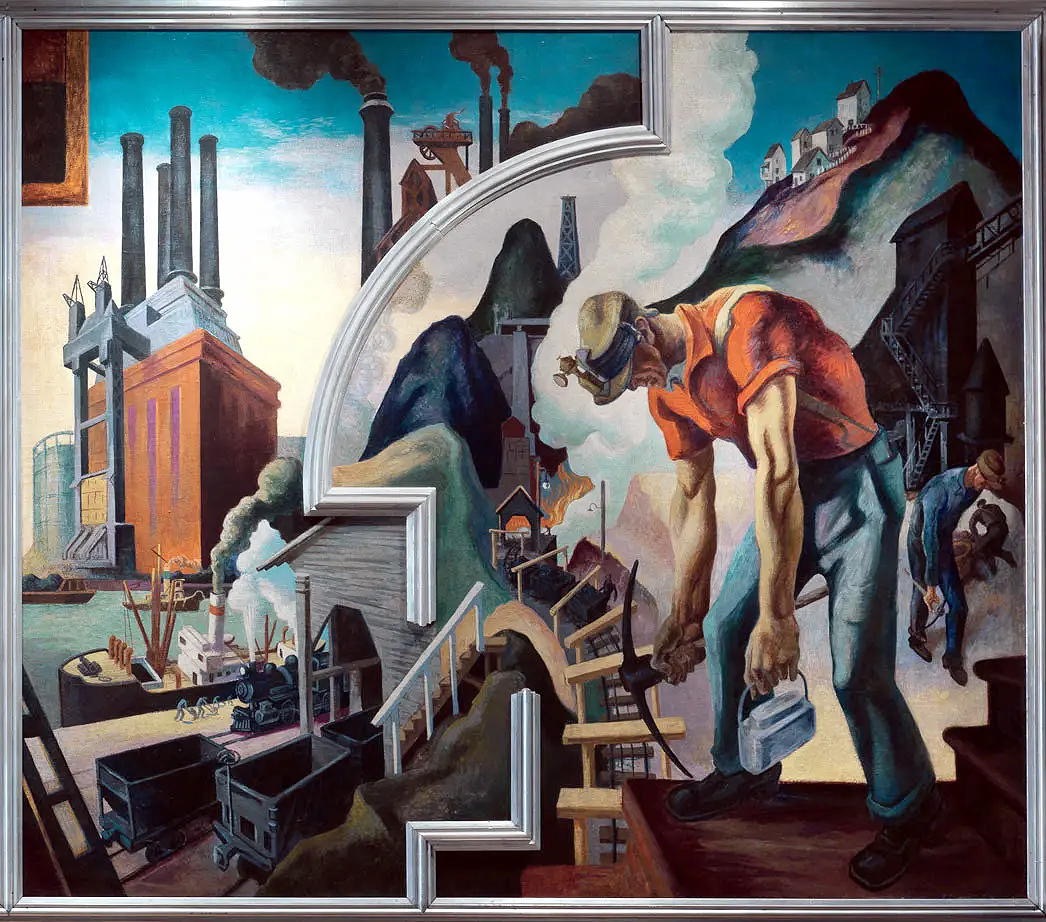
Thomas Hart Benton: "America Today" Mural (detail), “Coal” (1930–31)
" … it sure is a good thing that The Muse and I relocated to overlooking The Center of the Universe …"
As the ThirdYear of Our Damned Pandemic began, its prolonged presence seemed to foreshorten our future. That April, our prior years' toodles around Paris and the French countryside seemed almost epic adventures dredged up from prehistoric times, times long past and unlikely to ever return, like an innocence forever lost, like coal once was. The Muse and I have so far dodged the Covid bullet, whether through early and frequent vaccination, obsessive masking, or dumb luck, nobody can say. Certainly people every bit as scrupulous as us fell prey and others who seemed scandalously passé stayed safe. Most recovered fully, but not all. A million people just in this country are absent today who wouldn't be gone had Covid-19 not come along. It remains, ebbing and surging, leveraging large number laws, quietly disappointing hopes and dreams.
The routine seemed perfectly sustainable at first, as any fresh experience might.
AtHardLabor

Thomas Hart Benton: Steel from America Today mural (detail) (1930–31)
"I know, ironic."
I seem to need to relearn a simple lesson each Spring, just as if each prior Springtime hadn't taught me the same damned thing. I leave my long Winter hibernation with aches and pains I can never remember acquiring. It's not like the season had demanded too much of me. Aside from a few simple snow shovelings and some firewood carrying, I hardly stretch a muscle once the Autumn leaf harvest is in. I still awaken with a grumbly back or something. It's always something. A muscle group complaining without a discernible cause. I limp around and attempt my annual stoicism performance, which fools and entertains nobody, especially me. Eventually, even The Muse catches on that I'm aching. I take my ibuprofen and attempt to carry on, avoiding strenuous activity.
Then I relearn that I need some strenuous activity to iron out Winter's remaining wrinkles.
Hesitance
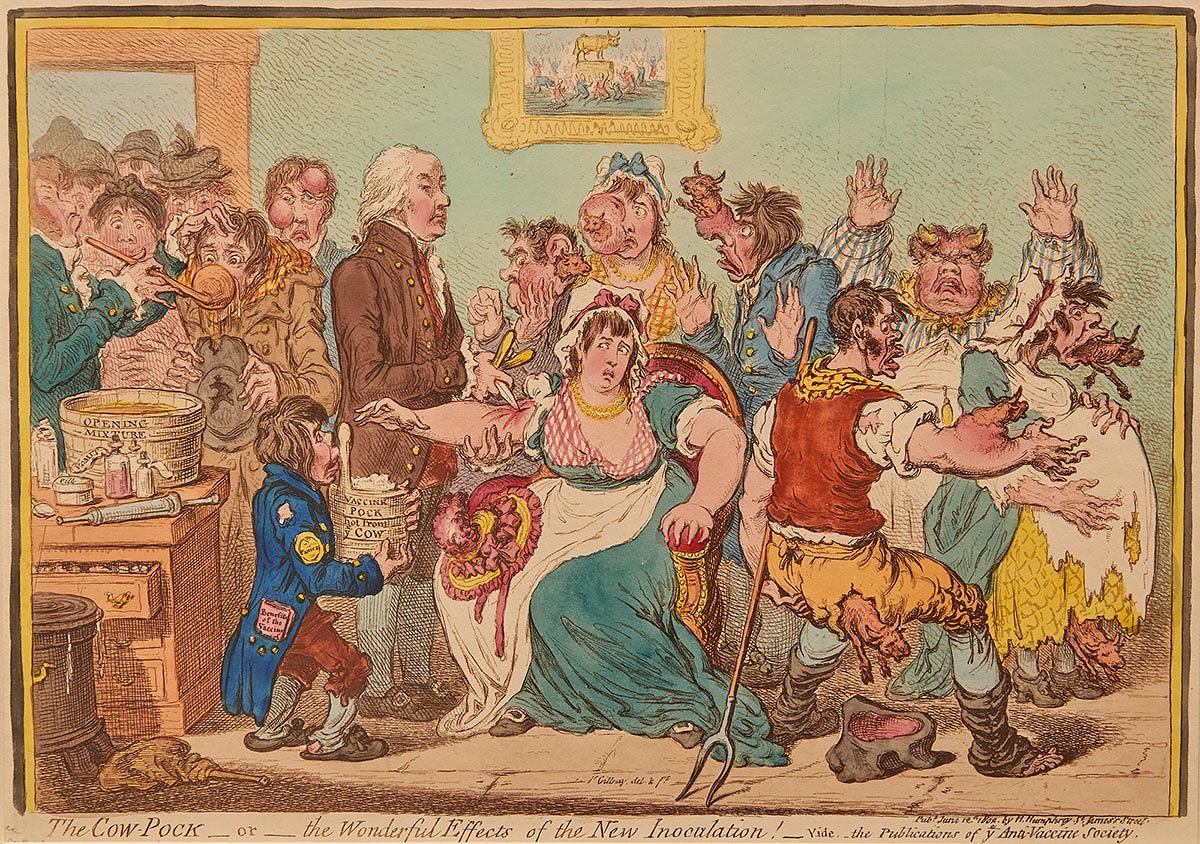
James Gillray: The cow-pock,
-or-The wonderful effects of the new inoculation!
- Vide - the Publications of ye Anti-Vaccine Society (1802)
"I'm more of an amateur than that."
He who hesitates might be temporarily lost, but not often permanently so. The one who tries to seize the day to appear decisive more easily loses himself, but doesn't seem to notice. I usually opt for Hesitance over decisiveness if only because I only rarely ever seem to possess enough information to justify engaging very quickly. I tend to sidle up to experiences, suspicious of their impact and influence. I do not usually readily volunteer. I am an avowed and proud foot-dragger. I prefer to catch up rather than rush ahead. I'd really rather that you go first. I'm not being polite, just cautious.
Try as I might, I cannot quite manage to characterize my Hesitance as a vice.
ZenosReality

Pellegrino Tibaldi: Zeno of Elea shows Youths the Doors to Truth and False (Veritas et Falsitas) (C.late 1580s)
Fresco in the Library of El Escorial, Madrid
" … we might never notice ourselves incapable of stepping into the same river once."
It has long been a popular pastime among mathematicians and logicians to poke fun at the humble Zeno of Elea, a pre-Socratic Greek philosopher who left a memorable, subtle, and profound legacy of observations. He was the one who posited that one can never step into the same river twice and also the guy who cared enough to ask after the barber who shaved only those who didn't shave themselves, and wonder who shaved that barber's chin. Zeno pointed out how no arrow could logically hit any target, since each would subsume its progress by halving remaining distance, which could never logically resolve into any end point. His observations are today usually seen as provocations, interesting if largely irrelevant little insights into the limits of logical reasoning when explaining actual experience.
But we are not merely logical beings.
SmallWinters
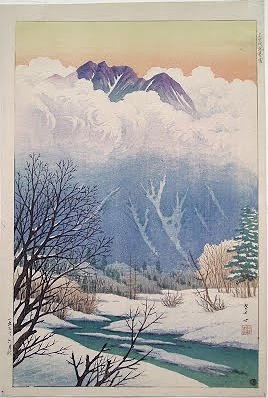
Itō Takashi: Spring Snow at Kamikochi (1932)
"My boot lugs still carry soil they picked up last season …"
It's funny, but I don't remember this much variety in prior springs here. Snow spots the backyard this morning where The Muse and I planted her new Mirabelle trees yesterday afternoon. An almost fierce wind kept me off the scaffolding again and the cold will prevent me from painting today, forcing me back inside just after I'd started feeling the rhythm of this season. As if to throw my timing off, it's almost winter this morning, as I was finally prepared for spring. Of course our Colorado springtimes featured full-blown blizzards, but here in these gentler elevations and under Japanese Current influences, I just expected more consistency than this.
If I went back and checked, though, I suspect that the record would show just this slow build of the season, even including some SmallWinters in it.
Permissions

Johann Michael Rottmayr: Apollo Granting Phaeton Permission to Drive the Chariot of the Sun (1690/95)
"I remain just as free as I'd ever care to be …"
As a gentleman of a certain age and social position, I suspect that many might suspect me of being free, or of at least feeling free to choose to do whatever I might choose to do, but that second suspicion would be far from the truth about me, a truth that only I could ever properly see. I have this gatekeeper inside me, and he decides for me what I might engage in and how. He's a stingy bastard, protective, and won't allow me to engage in just anything. He'd say that he at least tries to maintain certain "standards," but he administers them inconsistently enough that not even I can always predict what he'll permit and what he'll disallow. He insists that he's protecting my interests as he inhibits my freedom of movement and my liberties, not nearly as free as I might at first appear to be.
Consequently, I maintain a list of things he's frequently denied to me, if only to save myself the humiliation of him having to remind me again what kind of person I'm not.
AttractingAngels
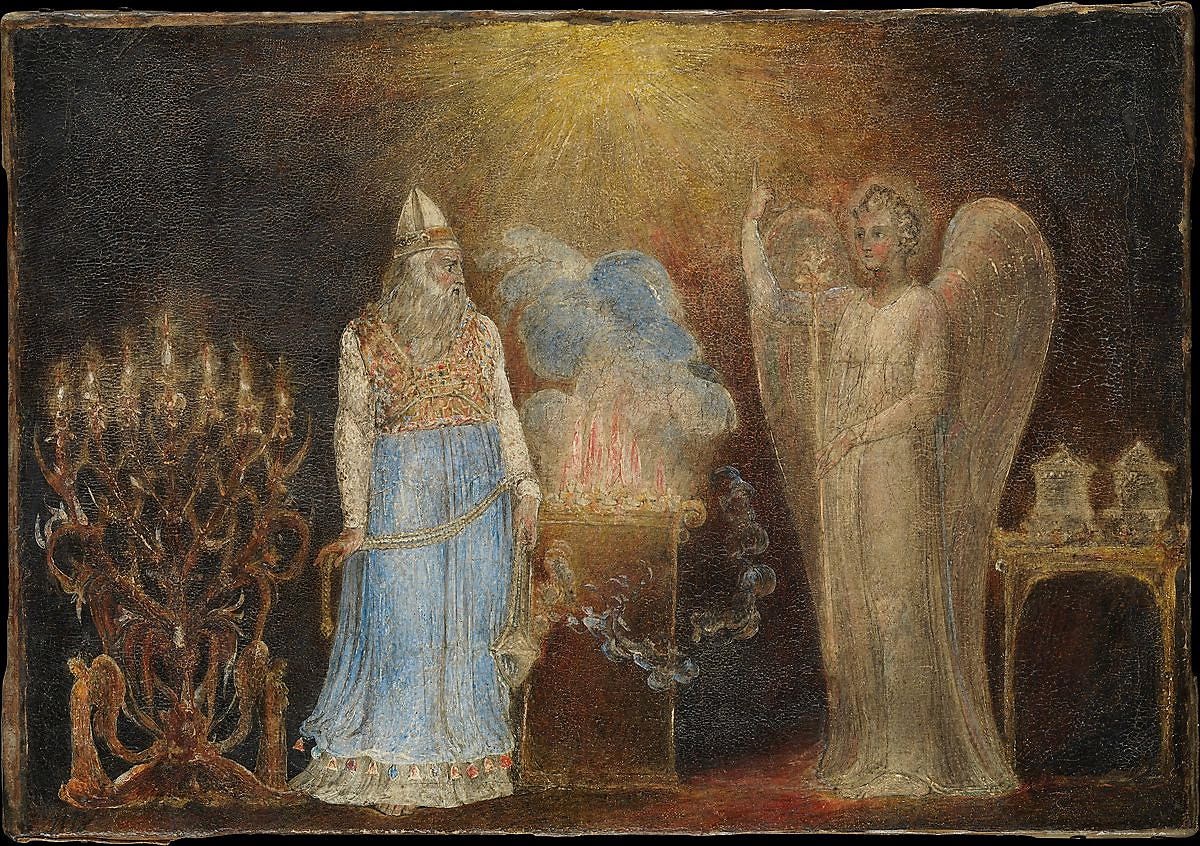
William Blake: The Angel Appearing to Zacharias (1799–1800)
"None of us ever was an island."
It's long been a matter of contention among theologians just precisely what human actions best serve the intention of AttractingAngels. Some insist that contrition works most reliably. Others vote for humility. Still others stand on the side of righteousness, believing that angels tend to hang with like-minded spirits. I anecdotally believe that angels seem to be attracted to trouble such that if I want to see an angel, all I have to do is get myself into some sort of trouble, even the generally irredeemable kind. If I can keep my eyes open and pay attention then, in my experience, I soon learn that whatever I did, innocent or not, if it resulted in trouble, it probably ended up attracting angels. Even sins tend to be fairly reliable attractors. In my humble experience, the kinds of angels I end up attracting do not seem all that picky about who they help. They're like the Lone Ranger but without the silly costuming. They mostly seem indistinguishable from any regular Jane or Joe. They'll let you know they're there.
Last night, I drove over to a nearby airport to fetch The Muse, who was returning from her first genuine business trip since the start of The Damned Pandemic.
GrapeHyacinth
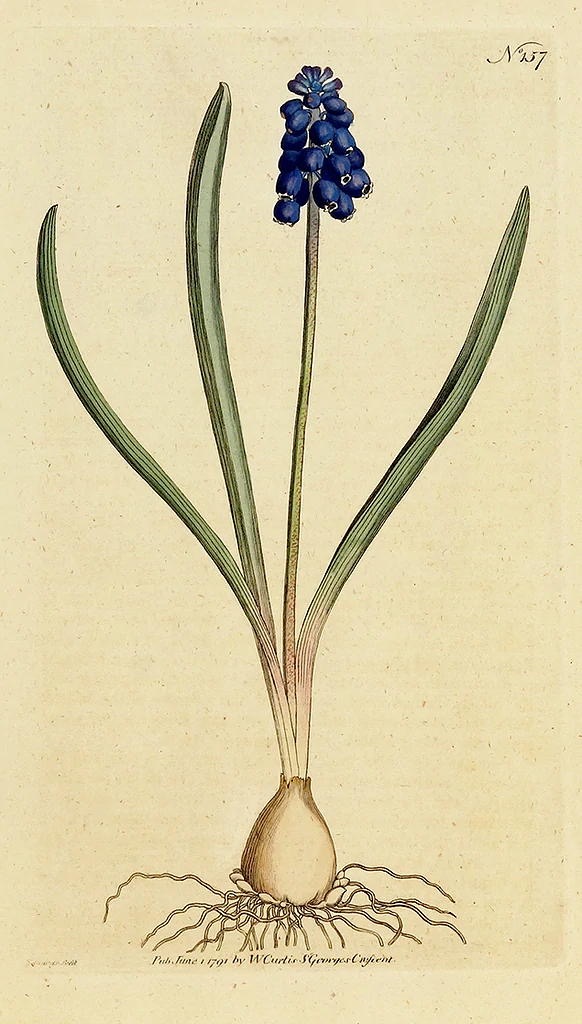
Publisher William Curtis in The Botanical Magazine, Hand-colored engraving #23727 (1791)
"I am not my name, either …"
In Spring, I channel my spirit flower, the humble, lovely, GrapeHyacinth. He embodies the season like no other bloom, an early riser and also a real eye catcher, he's up and at it before most others have broken ground. He's easily found and effortlessly, endlessly spreads into lawns, always beyond original intentions. He's utterly without pretension, simple, beautiful. He's neither grape nor hyacinth, but GrapeHyacinth, in that curious way that English allows a negation to become an identity. He is precisely not what he's named, but almost entirely something else.
I cannot bear to mow over that piece of lawn into which my sacred GrapeHyacinths have spread.
Scaffoldingly
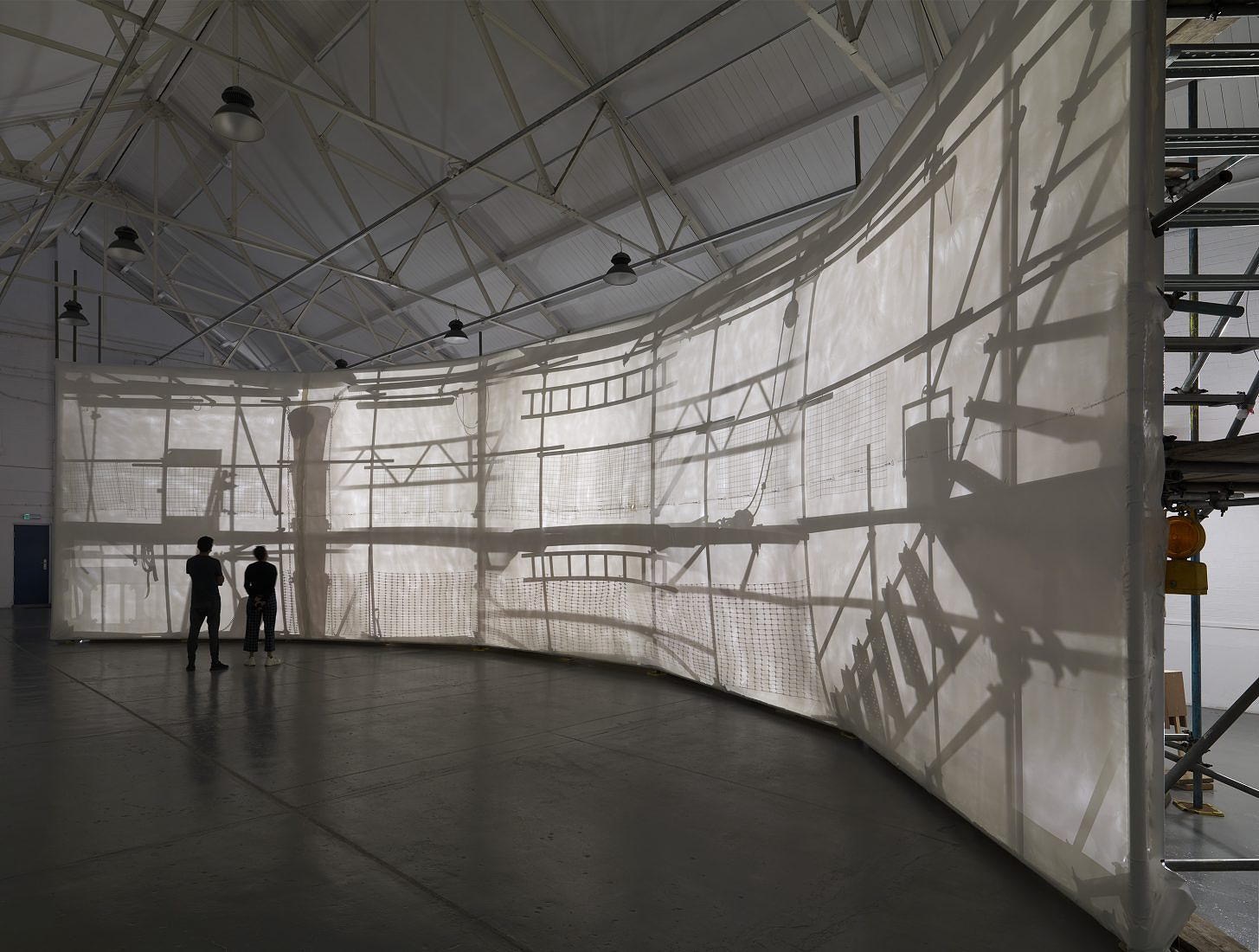
Shubha Taparia: Crescent (2021)
"I seem to need to expose myself to a certain amount of danger …"
I may have identified the source of my sense of disconnection with the recent changing of the seasons. After a long and lonely enough Winter season, Spring should have welcomed me with open arms and I really should have stepped right in there for a reassuring hug. I became stand-offish instead, as if Spring were trespassing upon my private space. I had become complacent over the final few weeks of that bleakest season, wasting opportunities to engage in this or that project, seemingly satisfied to lean back and let a little time pass by me. That was never satisfying work, but more of a defensive effort. After The Grand Refurbish ended mid-December, I'd retrenched, feeling aimless. The Muse was after me to finish a few projects, but I remained steadfastly disengaged, fitfully napping. Nothing really seemed worth doing after engaging in such a grand and satisfying furbish. Every alternative engagement just seemed to fall tragically short of something. I practiced moping.
Yesterday, Kurt Our Painter brought over his pickup truck to help me fetch scaffolding so that I could start a rather modest repainting of The Villa's outside.
Ninja

From Suikoden of Japanese Heroes (Yeiyû Yamato Suikoden,
英雄日本水滸伝)
Publisher: Kujioka-ya Keijirô (c. 1843)
Scene: Ogata Shuma (later Jiraiya) raising his sword to kill a python attacking a large toad,
Jiraiya is portrayed as being a ninja.
" … more lifestyle than profession."
I'm afraid that I feel compelled to break with a semi-sacred tradition and report that I am a Ninja. Yes, anyone engaging as a Ninja was cautioned in their training to keep their true identity secret, though no clear punishment was associated with violating this warning. I well understand the complications this disclosure might create, for the first and most enduring response to any Ninja disclosing their secret tends to be incredulity. Nobody ever believes it. They treat this confidence as a joke, since no Ninja in the history of this world so far ever looked like they might be a Ninja when they're out of costume, and, indeed, the costuming might well account for ninety percent of a Ninja's magic. Ninja-ing's a cosplay occupation.
I've confided this secret before, though never quite this publicly.
Pruning
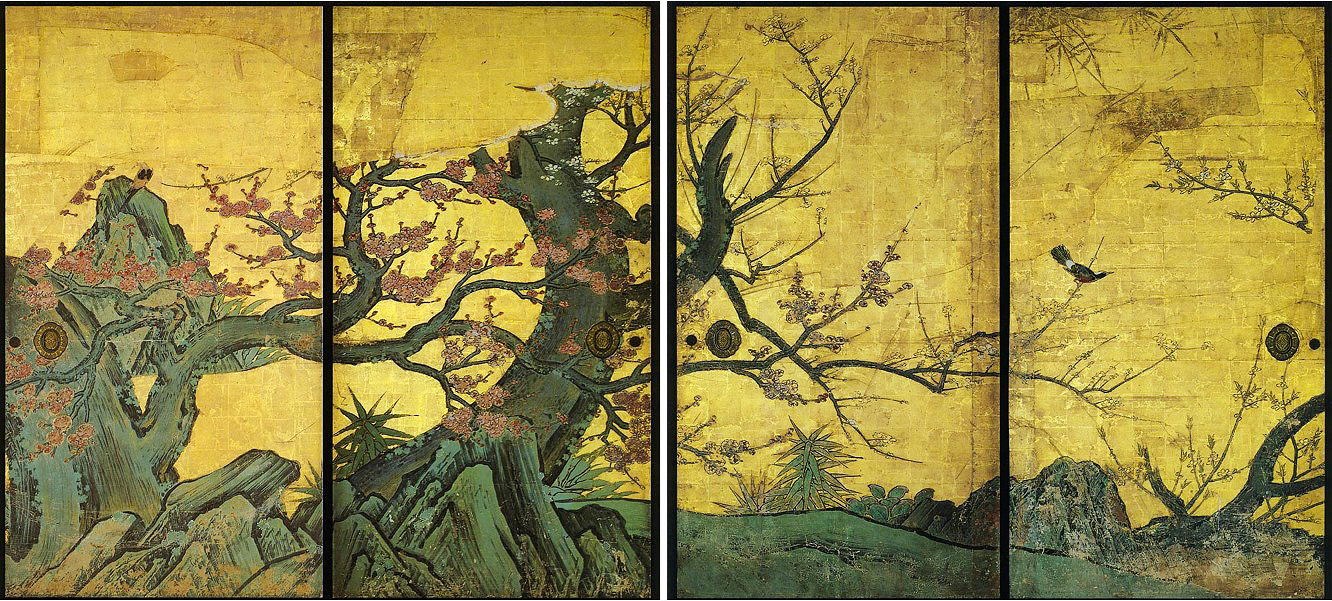
Kanō Sanraku: Set of sliding doors of Plum tree (early 17th century)
" … the Sum total of all I could not bear to Prune."
With Spring comes the great cutting back, the annual Pruning effort which eliminates unwanted excess while encouraging new growth. Pruning makes space for both new and different. It co-opts default repetition while heading off degradation. Even weeding might be considered a form of Pruning, since it, too, eliminates some life to encourage others.
I have always been a reluctant pruner, hesitating with my hedge trimmers and shy with my clippers.
Muse-led

Charles Meynier: Apollo and the Muses, (late 18th century)
Polyptych, from left to right:
Polyhymnia, Muse of Eloquence
Erato, Muse of Lyrical Poetry
Apollo, God of Light, Eloquence, Poetry and Fine Arts with
Urania, Muse of Astronomy
Clio, Muse of History
Calliope, Muse of Epic Poetry
"Almost anything proves possible given perspective and well-informed choice."
I am not navigating by means of the nearly infamous Ded Reconning, which plays off past positions to imagine future ones. Christopher Columbus was reputed to have been a master Ded Reconner, famous for "finding" North America when he was searching for India. My reconning, the kind I employ here, might be properly referred to as Alive Reconning, for it relies much less upon the fates and intuition than does its Ded Reconning cousin. I might even suggest that I am never entirely alone when I'm navigating, for I firmly believe that my Reconning has always been inspired by muses, Muse-led.
I speak of The Muse when referencing my wife, but I speak now of The Muses who guide my trajectory when I'm unable to guide it myself, which is usually.
Incompleteness
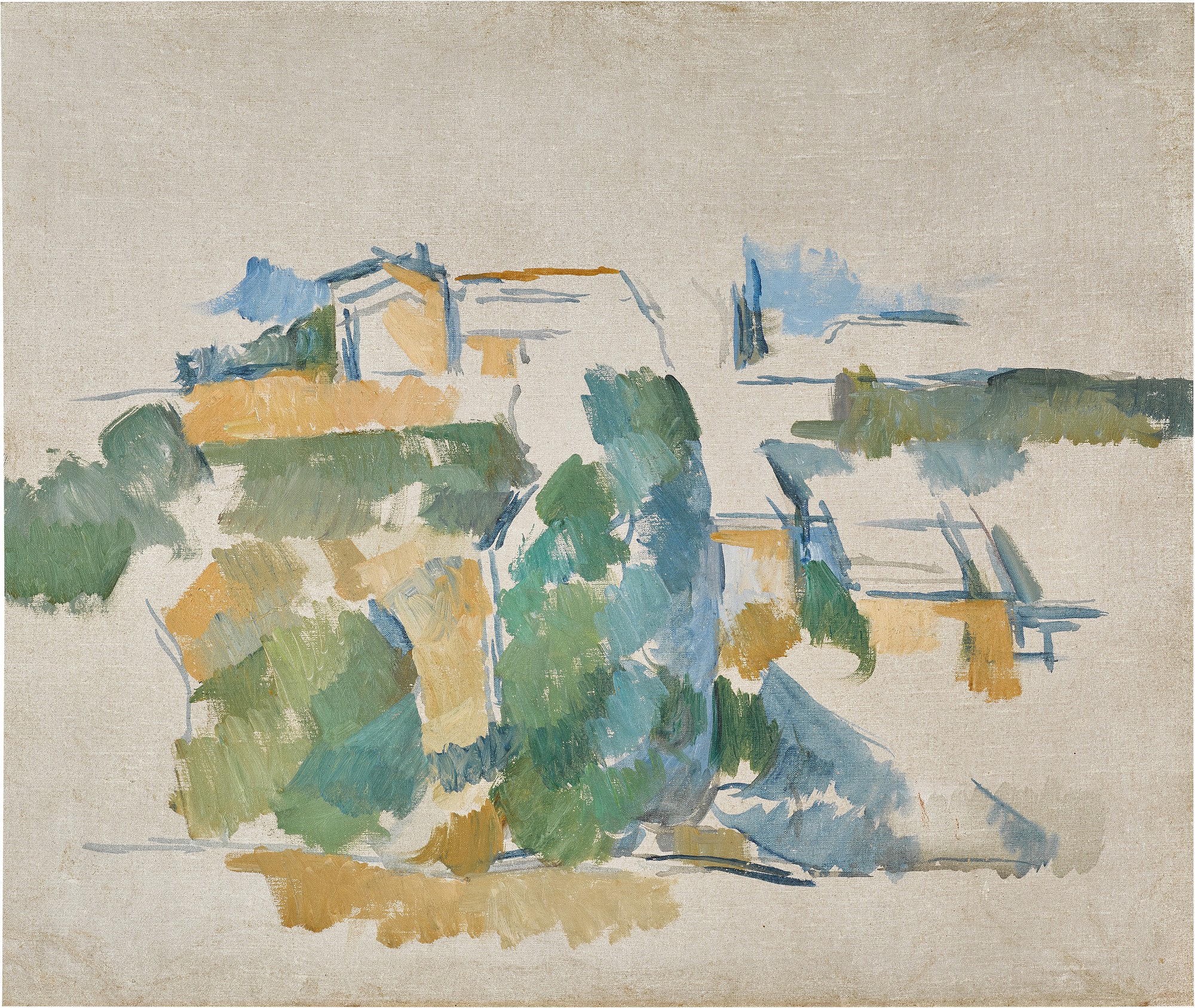
Paul Cézanne: Maisons parmi les arbres (circa 1904-06)
" … never finished, just contributed."
If I were charged with grading my performance so far in my life, I would not assign an immediate 'A', and not a 'B', either; nor a 'C', 'D', or even an 'F', and not only because I have not yet finished performing. I suspect that I still have an act or two left, perhaps even a few more full productions to produce, but I harbor few delusions that any future performance might nudge my grade up into the exemplary range. I am pretty much who I am. I no longer stay up late studying to achieve the next level of anything. Those who love me, love me. Those who do not, don't. I'm not completely uninterested in flipping my critics or in chasing away my fans, but I certainly do not invest much sweat toward achieving either. I am just about who and what I am, no more and little else. So what grade would I assign to my own performance so far? I'd award a big fat Incomplete, the orthogonal judgement, the forgotten achievement. Whether any fat lady's sung or not, my performance ain't quite finished yet.
Famous composers and artists left behind unfinished symphonies and paintings, so do us less famous brethren.
Scrounging
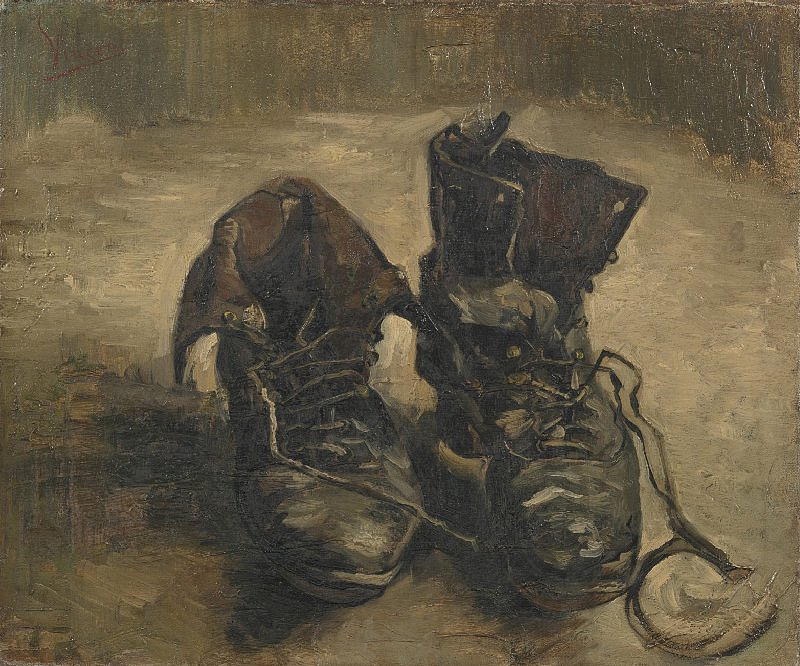
Vincent van Gogh: Shoes (1886)
"Without such provocations, I might never feel truly inconvenienced."
Scrounging tends to be one of the early casualties of prosperity. The dumpster diver becomes a WalMart shopper and a trajectory changes forever. Aging, though, can shift certainties to reintroduce the vagaries one might not have even noticed losing. Proud ones might faunch at the shift, feeling as though they've been assaulted or rendered undignified by it. The lucky ones might notice a certain vitality reentering their lives as what they'd grown accustomed to perceiving as their birthright is formally denied them. Insurance companies seem particularly adept at denying access once considered sacrosanct. For me, after The Muse shifted health insurance companies, the inheriting operation refused to pay for a refill for the only prescription I felt certain actually delivered on its promise. They were, of course, absolutely obtuse about their reasoning, never once actually confirming what they'd done, leaving it up to pharmacy clerks and nurses to attempt to interpret their intention and deliver their message.
As near as any of us could tell, they'd denied the refill request in spite of doctor's orders and expressly because the prescription actually worked.


